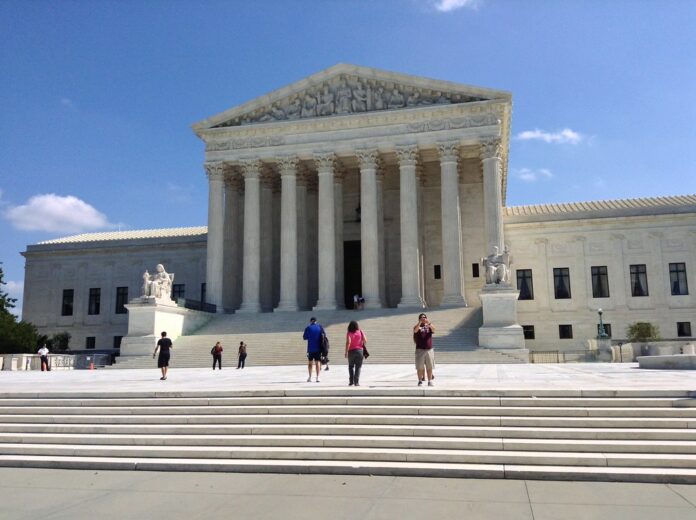UC President Janet Napolitano, Attorney General of California Xavier Becerra comment on DACA hearings
The nine U.S. Supreme Court justices heard oral arguments both for and against the ending of Deferred Action for Childhood Arrivals, also known as DACA, on Nov. 12. Their ruling will impact the trajectory of the over 660,000 undocumented young adults in America who are DACA recipients.
DACA started in 2012 under President Barack Obama’s administration as a program to defer deportation for immigrants who came to the U.S. without documentation as children. Recipients of DACA — a status that lasts for two years before it must be renewed — are able to legally remain and work in the country. In 2017, however, President Donald J. Trump called for a “wind-down” of the program, with then-Attorney General Jeff Sessions announcing the program’s recission.
Several lawsuits, including one from the UC — the first university to file a suit against the recission of the program — were filed against the administration. Ultimately, on June 28, 2019, the Supreme Court agreed to review the challenges, contesting whether the courts had the authority to review the DACA recission and whether DACA was constitutional, if the program was deemed reviewable.
Young adults whose lives may be changed by the ruling currently face challenges living as undocumented individuals.
“My community has long been exploited and overlooked, constantly used as a disposable resource,” one undocumented UC Davis student said in a statement. “I have longed for a future where I feel included and valued under the current socio-economic environment.”
California Attorney General Xavier Becerra, who was present at the Washington D.C. hearing, was optimistic about that future. In a press conference on Nov. 12, Becerra underlined two points that he thought emerged during the oral arguments.
“First, that the courts had the right to review the recission made by the Trump administration,” he said. “Second, that the actions by the Trump administration were unlawful, unwise and consequential for many Americans.”
If the Supreme Court rules that DACA is unlawful, the Trump administration’s decision to end the program will remain valid. As DACA recipients’ statuses expire, so does their ability to work and stay in America, putting thousands of young adults — including the over 1,700 in the UC system — at risk for deportation.
The UC has been an advocate for the program in a number of ways, according to Brandon Minto, the director of federal government relations with UC Davis Government and Community Relations. Aside from starting the “I Stand With…” campaign on Oct. 22, Minto said that the university has continually advocated for legislative solutions since he started working with the UC in 2015.
“We’ve had phone banks on campus where we organized a pizza lunch for people to call Congress and talk to them,” Minto said, adding that advocacy work ramped up in advance of the court case.
Minto worked with the UC Davis AB540 and Undocumented Student Center to write DACA profiles, stories from undocumented students that members of the California delegation could read on the floor of Congress.
After the hearing, Minto participated in a call for presidents of institutions that are part of the President’s Alliance on Higher Education and Immigration. He said that legal scholars present discussed what might happen based on the justices’ line of questioning.
“They’re predicting DACA will be ruled unlawful,” he said. “But I’m hesitant to say that they would find DACA unlawful, because that’s just forecasting. Even one of the scholars said, ‘Anyone who tries to tell you how the court’s going to rule doesn’t know what they’re saying.’”
Should DACA end, UC President Janet Napolitano said that the UC would continue to support students through centers on the various UC campuses and by providing free legal services to undocumented students.
Napolitano, the secretary of Homeland Security when the DACA program began, did not make any predictions about whether or not the court would side with the Trump administration. She said, nonetheless, that the case was well-briefed and argued by both sides and that she trusted the court after it wrangled with legal questions.
She also addressed a Nov. 12 tweet from Trump, stating “Many of the people in DACA, no longer very young, are far from ‘angels.’ Some are very tough, hardened criminals.”
“The president’s tweet is just wrong,” Napolitano said. “To be enrolled in DACA, you can’t have any felony convictions, no serious misdemeanor convictions and [you need] a clean criminal record. I’m not sure the president has met DACA criminals.”
Napolitano said she expected the final ruling to come in spring, earlier than the court’s deadline of June. In the interim, the AB540 and Undocumented Student Center said in a statement that they “continue to provide holistic support and resources for the community.”
“As the University of California asserts its support for undocumented and DACAmented students and advocates judicially for DACA, we will continue to enrich and seek justice for our community as we push for a clean Dream Act,” the statement concluded.
Napolitano said that the court’s ruling would have a profound impact.
“These are young people who have done all that has been asked of them,” she said. “To make them subject to eviction from the only country they know as home is inconsistent with good immigration policy and inconsistent with our values as a country.”
Written by: Janelle Marie Salanga — campus@theaggie.org









